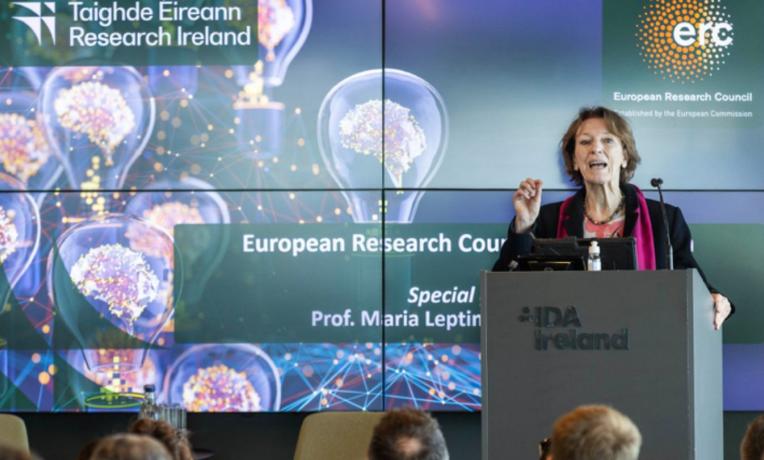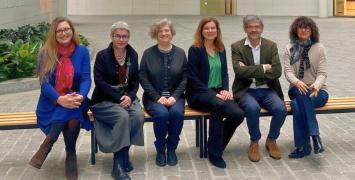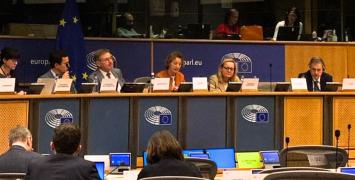ERC President’s speech at ERC Impact Forum in Dublin

-- Check against delivery --
Dear friends and colleagues,
It's great to be back in Ireland - I was here last in November 2022 at the invitation of the Royal Irish Academy.
Thank you very much to Research Ireland for organising and hosting this and I look forward to listening to the ERC grantees presentations later on.
Ireland is a country we must admire for its tenacity, its creativity, and its remarkable journey of transformation. But I'm not here to flatter. I'm here because together, we have an important conversation ahead: one about science, innovation, and the role of public investment in shaping our future.
Why governments around the world have a stake in supporting research and innovation.
I want to start by reminding us all why governments around the world have a stake in supporting research and innovation. The arguments are well-established but often forgotten.
Economists like Robert Solow and Paul Romer, Nobel laureates both, demonstrated that innovation is the cornerstone of long-term economic growth. What they showed is that it isn't merely the accumulation of capital and labour that makes economies thrive-it's innovation, driven by new ideas, new technologies, and smarter ways of doing things. And innovation depends on new knowledge, and new knowledge has to be generated through research. Governments play an indispensable role in this process. They provide the foundation upon which private-sector innovation builds. They invest in the basic research and scientific infrastructure that the private sector-driven, understandably, by shorter-term profit goals-simply wouldn't fund at the scale required.
It's crucial to make clear, especially in front of those who guard public finances, that investing in research isn’t just spending. It's planting seeds for future prosperity. It's not charity to scientists, nor some bureaucratic indulgence. Instead, it's a pragmatic recognition that the public sector research base underpins the entire innovation system, creating fertile ground for breakthroughs that ultimately benefit everyone.
I've often heard the argument-indeed, I've heard it too often-that taxpayer money should be spent only where economic returns are guaranteed. On the surface, it sounds reasonable. But let’s reflect for a moment. What does 'guaranteed return' really mean? In the real world of science and innovation, the greatest impacts are often completely unpredictable. Basic research might appear uncertain or risky precisely because it explores unknown territory. Yet history shows us that the biggest economic leaps often come from curiosity-driven research with no immediate practical application in sight. Consider the internet, originally developed by publicly funded research programmes to support particle physics experiments. Nobody at the time could have foreseen its profound transformation of our economies and societies.
Conversely, let’s remember that public support for private-sector innovation is hardly risk-free. New start-upcompanies are far from guaranteed to succeed,industries rise and fall, technologies become obsolete, and billions invested can sometimes deliver little in return. The reality is, innovation is inherently uncertain, no matter where it takes place.
It’s tempting for policymakers to think of research and innovation as a smooth and predictable process, almost like a relay race with each runner perfectly handing the baton forward until reaching a clear, guaranteed goal. But that's not how research and innovation work.
In truth, the process of research and innovation resembles a rugby match far more closely-it's chaotic, unpredictable, often messy. Players run forward, get tackled, drop the ball, and sometimes lose ground. In research and innovation some projects end abruptly, going nowhere; some ideas fail entirely, leading to what seems like wasted effort and resources. In isolation, many research efforts appear unsuccessful, incomplete, or even misguided.
Think of the lithium-ion battery. This is obviously an extremely important technology. It helped make portable electronics possible, from laptops to smartphones to drones. It’s literally powering the transition to electric vehicles, and it’s increasingly finding a role in grid-scale energy storage, enabling more construction of intermittent renewables and helping with electric power decarbonization.
But to get there, the lithium-ion battery took a long, winding road. Its development had numerous false starts, setbacks, and outright failures-materials that didn't perform, prototypes that couldn't scale, costly ventures that never made it off the drawing board. It took decades of research, performed around the world, before a practical lithium-ion battery was possible.
Research and innovation are therefore collective efforts. The job of policymakers is not to demand immediate success from every attempt but rather to support and encourage the entire messy, dynamic, collaborative process.
This might sound disappointing, but the good news is that in the aggregate, publicly funded research, especially basic research, provides remarkable returns on investment. Recent OECD studies underline that countries investing significantly in science and innovation consistently achieve higher growth rates, greater resilience, and increased economic productivity. Beyond these measurable impacts, there's a wider range of benefits often overlooked - benefits like creating highly skilled, creative people who flow through our societies and economies. The public research system doesn’t just produce discoveries and inventions; it produces human capital. Universities and research institutions are not merely factories of knowledge but vibrant training grounds, shaping minds that go on to lead in industry, public service, and beyond.
Moreover, public-sector research is necessary for international collaboration and networking. Scientific research transcends national boundaries effortlessly, building relationships and networks that yield diplomatic and cultural returns as well as scientific ones. Ireland, more than many, knows the value of these global connections. Irish researchers punch well above their weight in securing international collaborations and in influencing global scientific discussions.
To strengthen my point, I’ll be blunt: nations that undervalue or underinvest in basic research risk becoming passengers rather than drivers of the future. I speak from a European perspective when I say that we cannot afford complacency or short-sightedness at a time of unprecedented technological and geopolitical shifts. Europe’s competitive edge - our collective ability to innovate and lead - is at stake. And Ireland’s future competitiveness is similarly intertwined with its commitment to a robust, publicly funded research system.
The economic rationale, the social returns, the international networks, and the human capital developed through public-sector research are not luxuries-they are necessities. Ireland has made commendable strides already. Your investments, your institutions, and your researchers have increasingly made a name for themselves in Europe and internationally. But there is no room for resting on laurels, as comfortable as they might feel at this moment.
This is why I urge all of you, particularly those in political leadership, to continue and indeed accelerate your support for research and innovation. Let’s invest in curiosity-driven science, the kind that asks fundamental questions about the universe and our place in it. Let’s ensure that Irish researchers have the resources they need not just to compete, but to excel globally.
In sum, governments don’t just support research and innovation because it's good economics, though it undeniably is. They support it because it shapes a better, more prosperous, more resilient future. It builds the very foundations of our modern societies and ensures that our nations remain healthy and competitive.
I am confident that Ireland, with its strong scientific traditions and its ambitions for the future, understands these stakes profoundly. The question now is not whether to invest, but how boldly we can do it.
EU and national roles in funding research
Let me now turn to the critical issue of EU and national roles in funding research. Ireland has shown remarkable success in securing European funding, especially from the European Research Council. So far researchers based in Ireland have secured 245 ERC grants with a value of €385m, including 48 of our Proof of Concept grants. Your achievements highlight Ireland’s strength in fundamental research and the global competitiveness of your researchers.
Yet we must be clear. EU funding complements, rather than replaces, strong national investment. European grants are meant to amplify national efforts, not to fill gaps created by reduced national commitments. The future prosperity of Ireland-and indeed, Europe's competitiveness-depends significantly on national governments investing confidently in their own research base.
The recent Draghi Report and the Commission’s Competitiveness Compass underscore this message clearly. Europe urgently needs greater investment in research and innovation to remain competitive globally. Both documents stress that Europe's declining productivity growth demands decisive action and increased funding at EU and national levels. If Europe wishes to lead in new technologies, digital transformation, and sustainability, a substantial rethinking of our collective financial commitment is necessary.
A robust debate about the future of the EU budget is now underway. It is crucial for Ireland-and other Member States-to actively engage in shaping the future direction of EU funding. Ireland will have an important role to play during its EU presidency in 2026. I strongly urge you to support ambitious proposals for increased investment in research and innovation at European level. Europe's prosperity, security, and global leadership are at stake, and your voice will matter greatly in these discussions.
Equally, Ireland should continue to champion continued ERC independence, reinforcing the unique role ERC grants play in driving scientific excellence. Your researchers’ impressive track record demonstrates why the ERC model, driven solely by excellence and curiosity, is so effective.
To sum up, our joint success depends on clarity about our respective roles. The EU can and must do more-but national funding remains foundational. Ireland's continued leadership and advocacy for robust EU and ERC support will be essential as we shape Europe's competitive future together.
Getting to Denmark
Francis Fukuyama the famous American political scientist once came up with the idea of 'getting to Denmark'. Fukuyama used Denmark as shorthand for an ideal-prosperous, fair, efficient governance and a vibrant economy supported by a high degree of trust. I mention this because when I have been in Ireland before some people have asked me why is it that Denmark, a country with a similar population to Ireland, receives more ERC grants than Ireland. So maybe we can talk about 'getting to Denmark' in terms of research and innovation!
Both Ireland and Denmark are relatively small, outward-looking, open economies dependent on international trade. Both countries recognize the importance of research, innovation, and high-quality education for long-term economic success. Yet, Denmark has made certain strategic choices in public policy, research funding, and innovation strategy that many other countries can learn lessons from.
One of the main lessons is Denmark’s approach to public investment in research. Denmark spends consistently higher shares of GDP on public research compared to most European nations. But it's not just about spending more-it's about stability, predictability, and strategic planning. Danish investment in public research is consistent and stable, enabling long-term projects and ambitious research agendas to flourish. In contrast, Ireland's public investment has grown significantly, but I understand it remains somewhat unpredictable and subject to political cycles. To emulate Denmark, Ireland – in addition to increasing funding levels - must commit to stability and consistency over the longer term.
But let's not lose sight of how far Ireland has already come. The strides you have made in research excellence, your rising profile in the global scientific community, and the strong presence of multinational and indigenous companies speak volumes about your potential. Ireland is already internationally recognized for its strong research base and its ability to attract world-leading talent and investment.
Your strategic advantages, such as your native English-speaking population and your globally connected diaspora, are assets that Denmark does not share. These unique strengths provide Ireland with opportunities that can and should be leveraged effectively in building your innovation ecosystem.
Getting to Denmark, then, is not about copying Denmark. Rather, it's about identifying clearly why Denmark is successful-stable, strategic investment in research, a deeply integrated innovation system, and a high-quality and flexible skills base, and then applying these insights in ways uniquely suited to Ireland’s context, traditions, and strengths.
Conclusion
In conclusion, Ireland clearly has all the elements necessary for success-talented researchers, world-class universities, robust industry clusters, international networks, and remarkable societal cohesion. The task now is to integrate these elements strategically and consistently, building a uniquely Irish model of innovation and prosperity.
The ERC and broader European frameworks will remain your steadfast partners, amplifying your efforts, complementing your investments, and celebrating your successes. And I hope that you will continue to support our efforts at the European level.
But Ireland’s path to a prosperous, innovative future begins, most importantly, here at home. With determination, clarity of purpose, and sustained investment, I am convinced Ireland can and will create a future of unparalleled success, demonstrating to Europe and the world what is possible with vision, commitment, and courage.
Thank you.





